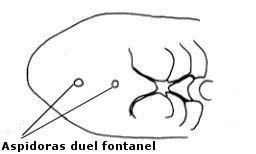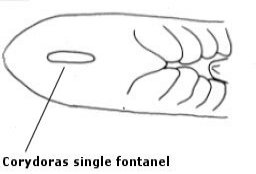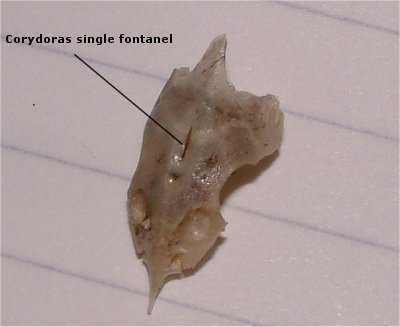SCOTCAT.COM
your internet guide to all things catfish
| The Genus Aspidoras |
by Allan James |
The type specimen of the Aspidoras genera is A. rochai, R. von Ihering 1907 and the latest discription in 2022 was (CW141) Aspidoras aldebaran, Tencatt LFC, Britto MR, Isbrücker IJH, Pavanelli CS., 2022. Below is the list of the 23 known species of Aspidoras and their exact location when discovered. In the last couple of years there has been a few Aspidoras species that have now put into synoynm including some C & CW-numbers. All Aspidoras belong to Lineage 2 with the exception of A. pauciradiatus which will prove to be a Corydoras and if a revision is carried out will be Gastrodermus (Cope, 1878) and a member of Lineage 5 alongside members of the "elegans group".
Aspidoras
aldebaran, Tencatt
LFC, Britto MR, Isbrücker IJH, Pavanelli CS., 2022.
Aspidoras azaghal,
Brazil, tributary of the Igarapé do Pontal, in
the remote Amazon region Terra do Meio, intersection
of the Xingu and Iri rivers. Aspidoras belenos, Britto 1998. Creek at Primavera do Leste - Paranatinga road, rio das Mortes basin, Estado do Mato Grosso, Brazil. Aspidoras
brunneus, Nijssen & Isbrücker 1976.
Serra do Roncador, km 125 of the road Chavantina-Casximba,
Mato Grosso, Brazil. Aspidoras
carvalhoi, Nijssen & Isbrücker 1976.
Açude Canabrava, Guaramiranga, Ceará,
Brazil. Aspidoras
depinnai, Britto 2000. Creek at Amaraji-Primavera
road, rio Ipojuca basin, 8°21'S, 35°26'W, Pernambuco
State, Brazil. Aspidoras
fuscoguttatus, Nijssen & Isbrücker
1976. Rio Paraná system, Córrego Corguinho,
estrada da Três Lagoas, 20°46'S, 51°43'W,
Mato Grosso, Brazil. Aspidoras gabrieli, Wosiacki, Pereira & Reis, 2014. Aspidoras kiriri, Oliveirs, Zanata, Tencatt & Britto, 2017. Brazil, Bahia, Varzedo, riacho Cai-Camarão, rio da Dona basin. Aspidoras
lakoi, Miranda-Ribeiro 1949. Córrego
na floresta do Grotão, frazenda da Cachoeira,
Muncípio de Passos, Minas Gerais, Brazil. Aspidoras
maculosus, Nijssen & Isbrücker 1976.
Rio Paiaiá, into headwaters of Rio Itapicurú,
ca. 11°S, 40°30'W, Bahia, Brazil. Aspidoras
menezesi, Nijssen & Isbrücker 1976.
Rio Granjeiro at Crato, 7°10'S, 39°25'W, trib.
on left bank of Rio Salgado, Ceará, Brazil. Aspidoras
mephisto, Tencatt, Bichuette 2017.
Brazil,
known only from the Anésio-Russão cave
system (Anésio III and Russão II caves),
part of the upper rio Tocantins basin.
Aspidoras
poecilus, Nijssen & Isbrücker 1976.
Creek upstream of village Porori, left bank of upper
Rio Xingu, Mato Grosso, Brazil. Aspidoras
psammatides, Britto,
Lima & Santos, 2005. Brazil, Estado da Bahia. Aspidoras
raimundi (Steindachner 1907). Rio Parnahyba
near Victoria, Maranhao State, Brazil. Aspidoras
rochai, R. von Ihering 1907. Fortaleza, Ceará,
Brazil. Aspidoras
velites, Britto, Lima & Moreira, 2002.
Brazil, Est. Mato Grosso, upper Rio Araguaia basin,
Rio Tocantins drainage. Aspidoras
sp. (CW052)
possible hybrid. Aspidoras
sp. (CW126) Brazil, Rio Teles Pires. Aspidoras
sp. (CW183) Brazil, Bahia. Aspidoras
sp. (CW184) Brazil, Bahia.
As can be gleaned from the above information, the genus Aspidoras are all to be found in Brazil, and that is where some of the identification problems arise, as a vast majority of the species are similarly coloured and marked and if you don't know the right location/river that they come from you are at a disadvantage right away as they will arrive from a central exporter in Brazil with maybe not even the right name attached to them.
Anatomical differences between Aspidoras and Corydoras: Eye:
very small in Aspidoras small in Corydoras. Below are line drawings of the skull formation of both genera and also a photo for clearer classification.
References: Nijssen
& Isbrücker; 1976, The South American
Plated Catfish Genus Aspidoras, R. von Ihering,1907.
|
If you would like to contribute an article, please e-mail me. You will of course be credited for your work.
If you would like to donate any denomination of money to the site just click the above link button. All proceeds will go to running the site and hopefully to keep it going for a few years yet.
Print or e-mail this factsheet below




